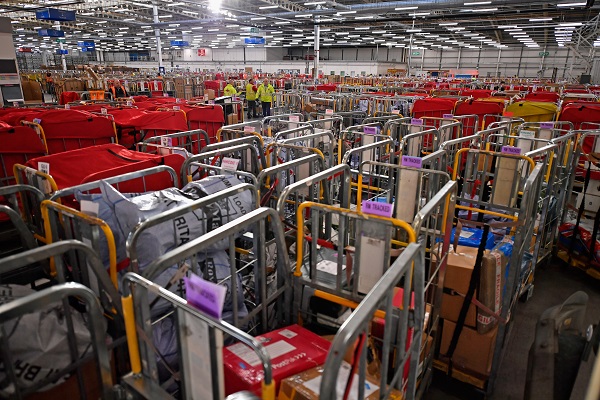Why Royal Mail shares wobbled after Q1 results
21st July 2021 08:34
by Richard Hunter from interactive investor
Royal Mail has been a major beneficiary of the pandemic, but what happens when we get back to normal?

It is increasingly evident that the pandemic was a pivotal moment for Royal Mail (LSE:RMG), and, so far, the group has overcome the challenges with aplomb.
The situation forced the transformation of the company at lightning speed, with a reduction in net debt enabling further investment into the automation of the parcels business, a reduction in controllable costs and the reintroduction of a dividend, with an implied yield of nearly 4%, to starved income-seeking investors.
- What to watch for in Royal Mai's results
- Your vote counts: Royal Mail, Halma and Premier Foods
- Royal Mail thrives during pandemic parcels boom
The question overhanging the future revolves around the burgeoning parcels business. The early evidence is that even after the expected drop in volumes over the last quarter, the direction of travel is clearly promising.
Against strong comparatives versus the height of the pandemic, Royal Mail parcel volumes dropped 13% in the first quarter to end of June versus last year, with the rate of decline increasing across the quarter as lockdown measures were eased.
However, perhaps more tellingly, the inevitable trend towards online shopping is evidenced by first-quarter parcel volumes being 19% ahead of pre-pandemic levels. At the same time, the overseas business General Logistics Systems (GLS) has ploughed on regardless, with a 10% increase in volumes against 2020 and 34% versus 2019.
How much of the elevated levels of online shopping remain will be critical to the group’s ongoing success, but the company is confident that the parcels business is rebasing to higher levels than pre-pandemic, as the letters business continues its inevitable and probably terminal decline.
As such, the quarterly figures read well, with group revenues increasing by 12.5% against 2020, and by 20.2% against 2019. The Royal Mail part of the business - UK Parcels, International and Letters division (UKPIL) - accounts for around two-thirds of the total and increased by 12.2% and 13.4%, while GLS added 12.4% and 36.2% respectively.
Challenges remain apart from the structural nature of parcel deliveries on the whole. The group is currently battling reduced air freight capacity and increased costs in fulfilling international orders, while closer to home the economic situation in the UK remains central, with the current Delta variant of Covid causing jitters and potentially stalling a nascent recovery. At the same time, competition in the sector remains fierce and the group will need to maintain the progress it has achieved thus far.
And, once again, management pointed to “significant short-term uncertainty as we begin to unwind from the impacts of the pandemic,” which means we still have no guidance on Royal Mail revenue for 2021/22.
- A guide on how investors can protect against inflation
- Top 20 most-bought UK shares in Q2 2021
- Subscribe to the ii YouTube channel and catch all our latest interviews and video content
- Check out our award-winning stocks and shares ISA
Historically, the share price performance has provided a white-knuckle ride for investors. From an initial float price of 330p in 2013, the shares peaked at 630p in May 2018 and then troughed at 124p in April 2020.
Over the last year, the turbocharged performance enabled the group to regain its FTSE100 status in June, with the share price rise of 190% comparing to a gain of 9.7% for the wider premier index. The market consensus of the shares remains equally optimistic on prospects, coming in at a ‘strong buy’.
These articles are provided for information purposes only. Occasionally, an opinion about whether to buy or sell a specific investment may be provided by third parties. The content is not intended to be a personal recommendation to buy or sell any financial instrument or product, or to adopt any investment strategy as it is not provided based on an assessment of your investing knowledge and experience, your financial situation or your investment objectives. The value of your investments, and the income derived from them, may go down as well as up. You may not get back all the money that you invest. The investments referred to in this article may not be suitable for all investors, and if in doubt, an investor should seek advice from a qualified investment adviser.
Full performance can be found on the company or index summary page on the interactive investor website. Simply click on the company's or index name highlighted in the article.